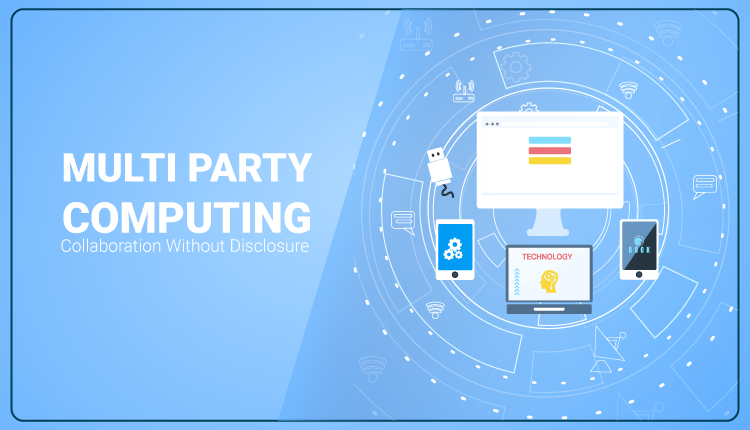Data Privacy is one of the most important and talked about aspects of fintech. The financial landscape is constantly evolving, driven by innovations that unlock new possibilities. Privacy is one such element of the whole fintech mix which needs constant innovation, scrutiny and betterment. Data privacy is also important to be taken care of, considering the prevalence of data breaches and regulations such as GDPR and CCPA.
The world of fintech is experiencing one such innovation in data privacy from the late 70’s – Multi Party Computing (MPC).
Secure multi-party computation is a method that can help businesses ensure the security of their sensitive data without undermining their ability to gain insights from it.
We are also experiencing MPC implications in blockchain technology and also a surge in MPC wallets.
What is Secure Multi Party Computing and Why is it Important?
MPC is a cryptographic technique that enables different parties to carry out a computation using their private data without revealing their private data to each other. In a general sense, MPC enables multiple parties – each holding their own private data – to evaluate a computation without ever revealing any of the private data held by each party (or any otherwise related secret information).
At its core, MPC allows multiple parties to jointly compute a function on their private data sets without ever revealing the raw data itself. It achieves this through intricate cryptographic protocols that break down the computation into encrypted shares, distribute them among the parties, and execute the calculation without anyone gaining access to the unencrypted data. Think of it as performing calculations on “blindfolded” versions of the data, where only the final result becomes visible.
By implementing MPC, financial institutions can securely collaborate on various tasks such as fraud detection, risk assessment, and customer authentication without compromising the privacy of sensitive data. For example, multiple banks can jointly analyse transaction data to identify fraudulent patterns without sharing specific transaction details with each other. Similarly, MPC can be used to facilitate secure peer-to-peer transactions, where parties can exchange assets or execute contracts without the need for intermediaries.
Read More about Fintech : What Are The Fintech Lending Benefits?
Significance of MPC
- Enhanced Security: Traditional single-point storage of private keys is vulnerable to theft or compromise. MPC distributes the key fragments across multiple servers, making it immensely harder for attackers to gain access.
- Reduced Human Error: Eliminating the need for individuals to manage sensitive data minimises the risk of human error, accidental loss, or malicious intent.
- Increased Transparency: MPC protocols can be designed for transparency, allowing participants to verify the integrity of computations without compromising privacy.
- Scalability: MPC can be scaled to support large numbers of participants and complex computations, making it suitable for various blockchain applications.
Implications for Blockchain Technology:
MPC holds immense potential for transforming blockchain technology in several ways:
- Secure Smart Contracts: MPC-based smart contracts can execute complex computations without exposing sensitive data, improving security and privacy for DeFi applications.
- Scalable Consensus Mechanisms: MPC can be used to develop scalable consensus mechanisms for blockchains, addressing current scalability limitations.
- Enhanced Governance: MPC can empower decentralised organisations by enabling secure and transparent voting processes without revealing individual votes.
- Improved Regulatory Compliance: MPC can facilitate compliance with regulations by ensuring data privacy and auditability while maintaining decentralisation.
The Rise of MPC Wallets
Leveraging MPC, MPC wallets offer a secure alternative to traditional hot and cold wallets. This cryptic security feature in its core makes MPC an asset for storing cryptocurrency. An MPC wallet serves as a digital tool for securely storing cryptocurrency, leveraging Multi-Party Computation to mitigate risks associated with single points of failure. Unlike traditional wallets, MPC wallets enable multiple users to establish a shared wallet, ensuring uninterrupted functionality even if one user encounters issues. Essentially, MPC wallets empower users to access, manage, and modify assets independently while safeguarding identities and shared assets.
Their key features include:
- Distributed Private Keys: Unlike traditional wallets, MPC wallets fragment the private key across multiple servers, significantly reducing the risk of a single point of failure.
- Enhanced Security: Approving transactions requires cooperation from multiple servers, making it much harder for attackers to gain unauthorised access.
- Recovery Options: Even if one server is compromised, the wallet remains secure as long as enough servers remain operational.
- Increased Accessibility: MPC wallets allow for multi-user access with granular control, making them suitable for institutions and collaborative custody.
Challenges and Considerations
While promising, MPC technology still faces some challenges:
- Computational Overhead: MPC computations can be resource-intensive, potentially impacting transaction speed and scalability.
- Complexity: Implementing and maintaining MPC protocols requires specialised expertise, which can be a barrier for smaller players.
- Regulatory Uncertainty: The regulatory landscape surrounding MPC is still evolving, creating uncertainty for businesses seeking to adopt this technology.
MPC Shining Bright on Our Future
The fintech industry is significantly affected by data privacy. MPC plays a vital role in security, may it be in blockchain technology or MPC wallets. The rise of MPC wallets further underscores the growing importance of MPC in securing digital assets and enabling secure transactions on the blockchain. As blockchain adoption continues to expand across various industries, MPC will play a pivotal role in shaping the future of decentralised finance, digital identity, and data privacy.
Latest Fintech Insights : How Does Fintech Makes Money?
[To share your insights with us, please write to pghosh@itechseries.com ]
